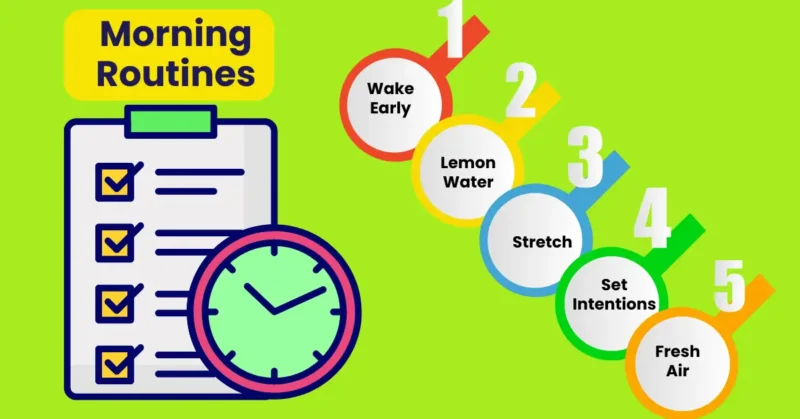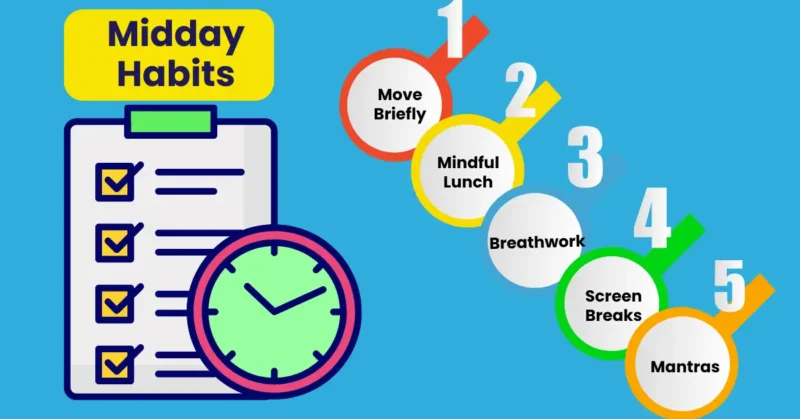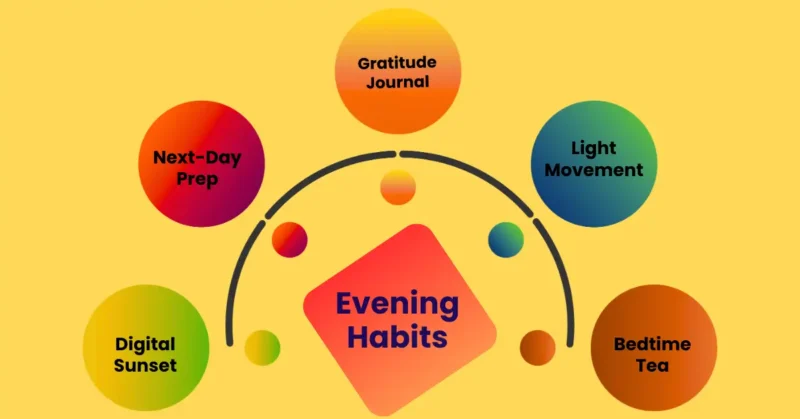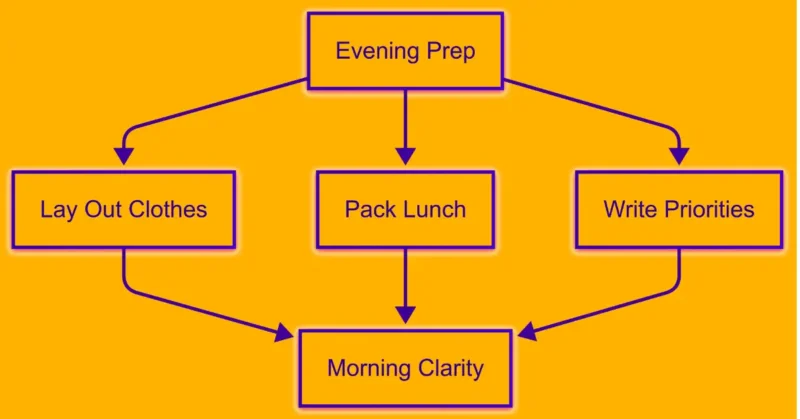Boost 15 practical wellness habits that support mental, physical, and emotional wellness—without the overwhelm. These are simple steps for busy people to live well daily.
Thank you for reading this post, don't forget to subscribe!How to Build Practical Wellness Habits That Fit Your Busy Life
Wellness doesn’t need to be complicated, expensive, or time-consuming. At its heart, wellness is about presence, balance, and consistent choices that support how we feel, not perform. Whether balancing a demanding career, managing a household, raising kids, or doing all three, you don’t need to schedule a two-hour yoga class or stock your fridge with rare superfoods to feel your best.
You need practical habits that easily blend into your daily rhythm, not disrupt it.
This guide offers 15 habits broken down by time of day: morning, midday, and evening. Each habit takes just a few minutes but has lasting benefits for your body, mind, and soul.
Morning Rituals That Set the Tone (Without Stress)
Mornings don’t have to feel chaotic. Your energy flows more clearly when you start your day gently and intentionally. You feel grounded, not frantic.

Here are five practical morning habits to help you feel focused and nourished before the busyness begins.
1. Wake Up 15 Minutes Earlier for Quiet Clarity
This tiny shift creates a peaceful buffer between sleep and action.
Use this time however you need:
- Sit in silence: Let your thoughts settle before the world demands anything from you.
- Journal: Write one page of anything—thoughts, dreams, worries, gratitude.
- Sip warm water slowly: No phone, no noise, just you and stillness.
Pro Tip: Leave your phone in another room overnight. If you use it as an alarm, switch to a sunrise clock.
These extra 15 minutes can differentiate between reacting to life and creating your day.
2. Drink a Glass of Warm Lemon Water
It is one of the easiest practical habits that has a significant impact.
Drinking warm lemon water first thing:
- Hydrates your body after 6–8 hours of fasting.
- Boosts digestion by stimulating stomach acid.
- It delivers vitamin C and supports your immune system.
- Flushes toxins gently and naturally.
Want to make it even more powerful? Add a pinch of Himalayan salt or a slice of fresh ginger.
This simple drink sets a tone of nourishment before coffee or breakfast.
3. Stretch for 5 Minutes (Not a Full Workout)
You don’t need to break a sweat. You need to move.
Five minutes of intentional stretching can:
- Increase blood flow
- Loosen tight joints
- Wake up your nervous system.
- Ease anxiety
Try this quick flow:
- Shoulder rolls (30 sec)
- Neck tilts (30 sec on each side)
- Cat-cow pose (1 min)
- Forward fold (1 min)
- Standing side bends (1 min)
- Deep breaths in mountain pose (1 min)
Bonus: Stretching first thing improves posture and reduces stiffness later in the day.
4. Write Down 3 Intentions or Priorities
Choose clarity instead of waking up to a mental traffic jam of tasks.
Keep a small notebook or sticky pad on your desk or bedside. Every morning, write 3 things you want to focus on—not chores, but core actions or mindsets.
Examples:
- Speak kindly to yourself today.
- Finish the report without multitasking.
- Text your sister to check in.
This small ritual grounds your mindset and helps you respond, not react.
5. Step Outside for Fresh Air
You don’t need a whole nature hike. Just open your door and breathe.
Even 2–5 minutes in natural light:
- Signals your circadian rhythm to wake up
- Boosts serotonin (the feel-good hormone)
- Calms the nervous system
- Increases focus and alertness
Walk barefoot on grass if possible. Grounding helps reduce cortisol levels.
No nature nearby? Crack a window. Let the outside in.
Midday Habits to Recharge and Refocus

The middle of the day can feel like a blur. We’ve checked emails, survived meetings, and powered through tasks, and now energy dips. These practical midday habits act like reset buttons.
6. Get Up and Move (Even Briefly)
Sitting is draining. Moving recharges you.
Even 3–10 minutes of intentional movement can:
- Reduce brain fog
- Boost circulation
- Release endorphins
- Improve posture and digestion.
Try:
- A brisk walk outside
- 10 jumping jacks
- Desk yoga or squats
- Dancing to one song
Hack: Set a recurring alarm for a “movement break” every 90 minutes.
7. Eat Lunch Away from Screens
Multitasking during meals leads to mindless eating and poor digestion.
Instead:
- Close your laptop
- Silence notifications
- Eat slowly and chew thoroughly.
- Tune into taste, texture, and hunger cues.
Even a 15-minute mindful lunch restores your energy more than an hour of distracted snacking.
Practical habit: Pack a nourishing lunch in advance—think fiber, protein, and color.
8. Do a 3-Minute Breathing Reset
Stress accumulates by noon. Breathing helps release it.
Try this easy breathing technique:
4-7-8 Method
- Inhale through the nose for 4 counts
- Hold for 7 counts
- Exhale through the mouth for 8 counts
- Repeat 3 rounds
Studies show this activates the parasympathetic nervous system and lowers cortisol.
9. Follow the 20-20-20 Rule for Screen Relief
Digital eye strain is real.
Every 20 minutes, look at something 20 feet away for 20 seconds.
This simple visual break:
- Reduces dry eyes
- Prevents headaches
- Improves focus
Place a sticky note on your monitor to remind yourself.
10. Say a Midday Mantra
Words shape our energy. When the day feels heavy, a short affirmation reveals you.
Examples:
- “I have done enough. I am enough.”
- “I breathe in calm. I exhale stress.”
- “This moment is mine.”
Say it aloud. Whisper it. Write it. Let it anchor you.
Evening Practices That Help You Unwind Gently

Evenings are a chance to soften, release, and return to yourself. These five habits support quality rest and mental reset without adding pressure or screen time.
11. Set a Digital Sunset
One hour before bed, power down the screens. The blue light disrupts melatonin and delays deep sleep.
Use this time for journaling, reading, stretching, or sitting silently.
Need help winding down? Try an audiobook or nature sound playlist.
12. Prep Tomorrow in 10 Minutes
A calm tomorrow starts tonight.
Before bed:
- Set out clothes
- Review your calendar
- Prep coffee or breakfast
- List 3 priorities for the next day.
These small actions reduce anxiety and support better sleep.

13. Keep a Gratitude Journal
Gratitude changes your brain—and your bedtime mood.
Every night, write:
- 3 things that went well today
- 1 person you’re thankful for
- 1 thing you’re looking forward to Tomorrow
Even on hard days, there’s something to honor. Gratitude builds emotional resilience.
14. Gentle Movement or Foam Rolling
Release physical tension before bed.
Try:
- Legs up the wall
- Reclining butterfly pose
- Foam roll your back and hips.
- Massage your feet with a tennis ball.
Movement clears tension and invites relaxation.
15. Sip a Bedtime Tea Ritual
Make sleep sacred. End your day with a calming cup.
Best herbal options:
- Chamomile
- Lavender
- Valerian root
- Tulsi (Holy Basil)
Add honey, light a candle, and breathe slowly. Your nervous system will know it’s safe to rest.

Habit Tracker Template
Use this template to build consistency with your practical habits:
| Habit | Mon | Tue | Wed | Thu | Fri | Sat | Sun |
| Lemon Water | ✅ | ✅ | ✅ | ✅ | ✅ | ✅ | ✅ |
| 5-Min Stretch | ✅ | ✅ | ✅ | ✅ | ✅ | ||
| 3 Intentions | ✅ | ✅ | ✅ | ✅ | ✅ | ✅ | |
| Midday Walk | ✅ | ✅ | ✅ | ✅ | ✅ | ||
| Gratitude Journal | ✅ | ✅ | ✅ | ✅ | ✅ | ✅ | ✅ |
Wellness Without the Overwhelm
We don’t need to overhaul our lives to feel better. These 15 practical habits are flexible, gentle, and effective. They help us reconnect with ourselves—without requiring perfection, hours of free time, or a lifestyle overhaul.
Start with just one habit this week, layering in more as they feel natural. Consistency—not intensity—is the secret to lasting wellness.
Key Takeaways
- Wellness is built in small, sustainable steps.
- Morning clarity boosts daily flow.
- Midday movement and breaks fight burnout.
- Evenings should focus on rest, not productivity.
- Choose habits that fit your rhythm, not someone else’s.
FAQs
Q. What are 10 healthy habits?
Healthy habits are small actions that support your overall well-being. Ten powerful ones include drinking enough water, getting 7–8 hours of sleep, eating balanced meals, moving your body daily, managing stress, practicing gratitude, limiting screen time, spending time outdoors, washing hands regularly, and maintaining a positive mindset. These habits improve your energy, immunity, and mental clarity. They’re simple but consistent. Even small changes can create significant results. Choose one habit to begin with and build from there.
Q. What are examples of good habits and bad habits?
Good habits include exercising regularly, reading daily, eating whole foods, and showing kindness. These actions support health, learning, and relationships. In contrast, bad habits like procrastinating, smoking, excessive screen time, or skipping meals can harm your body and mindset. Good habits lead to growth; bad ones drain your energy and focus. The key is awareness—notice patterns and replace harmful actions with helpful ones. One small change can shift your entire day. Start with progress, not perfection.
Q. What are two personal habits that serve you well, and how?
Journaling each morning and taking a daily walk are two habits that serve many well. Journaling clears the mental clutter and sets a focused intention for the day. It strengthens emotional awareness and reduces anxiety. Walking, even for 10–15 minutes, improves mood, supports physical health, and sparks creativity. Both habits are simple, free, and adaptable to any schedule. They boost clarity and energy naturally. These routines can anchor your day in mindfulness and movement.
Q. Which of the following is an example of a healthy habit?
Drinking water instead of sugary soda is a classic healthy habit. It supports hydration, digestion, energy, and overall health. Choosing water over soda reduces your intake of empty calories and harmful sugar. Other healthy habits include stretching in the morning, sleeping regularly, and preparing home-cooked meals. Healthy habits nourish your body, mind, or spirit. They help prevent illness and promote wellness over time. Even one healthy switch makes a difference.
Q. What are the top bad habits?
Some bad habits include staying up too late, skipping breakfast, constantly checking your phone, overeating processed foods, and negative self-talk. Others are smoking, excessive caffeine, poor posture, and avoiding exercise. These habits can lead to stress, fatigue, illness, and reduced focus. Most develop slowly and unconsciously. Becoming aware is the first step to change. Replacing even one bad habit with a positive one can create lasting improvements.
Q. What are 10 good habits for kids?
Teaching kids good habits early helps shape their future. Ten great ones include brushing teeth twice daily, eating fruits and vegetables, playing outside, reading daily, sleeping on time, cleaning up after themselves, practicing kindness, limiting screen time, expressing gratitude, and washing hands before meals. These habits build responsibility, health, and self-esteem. They also foster independence and emotional resilience. Parents can lead by example and celebrate small wins. Consistency is key to making habits stick.
Final Words
You don’t need to overhaul your life to live well. These 15 practical habits take minutes, not hours, and don’t require apps, gyms, or perfection. They connect to your body, your breath, and your peace.
Start with one habit. Then another. Let them build.
Wellness isn’t a task. It’s a rhythm, and with these simple rituals, it fits beautifully into your life.
Read more life-balance articles.
You might like:

